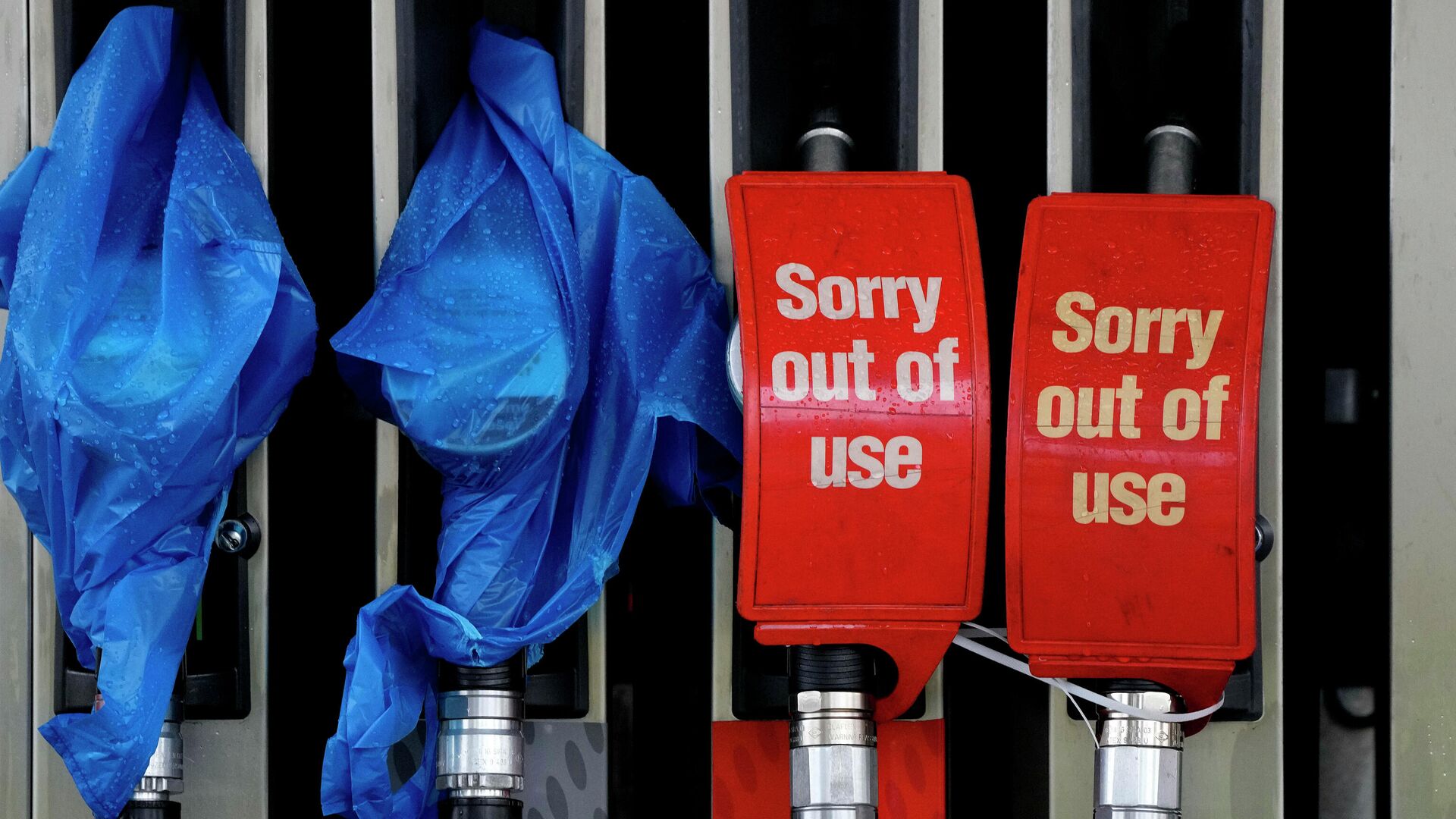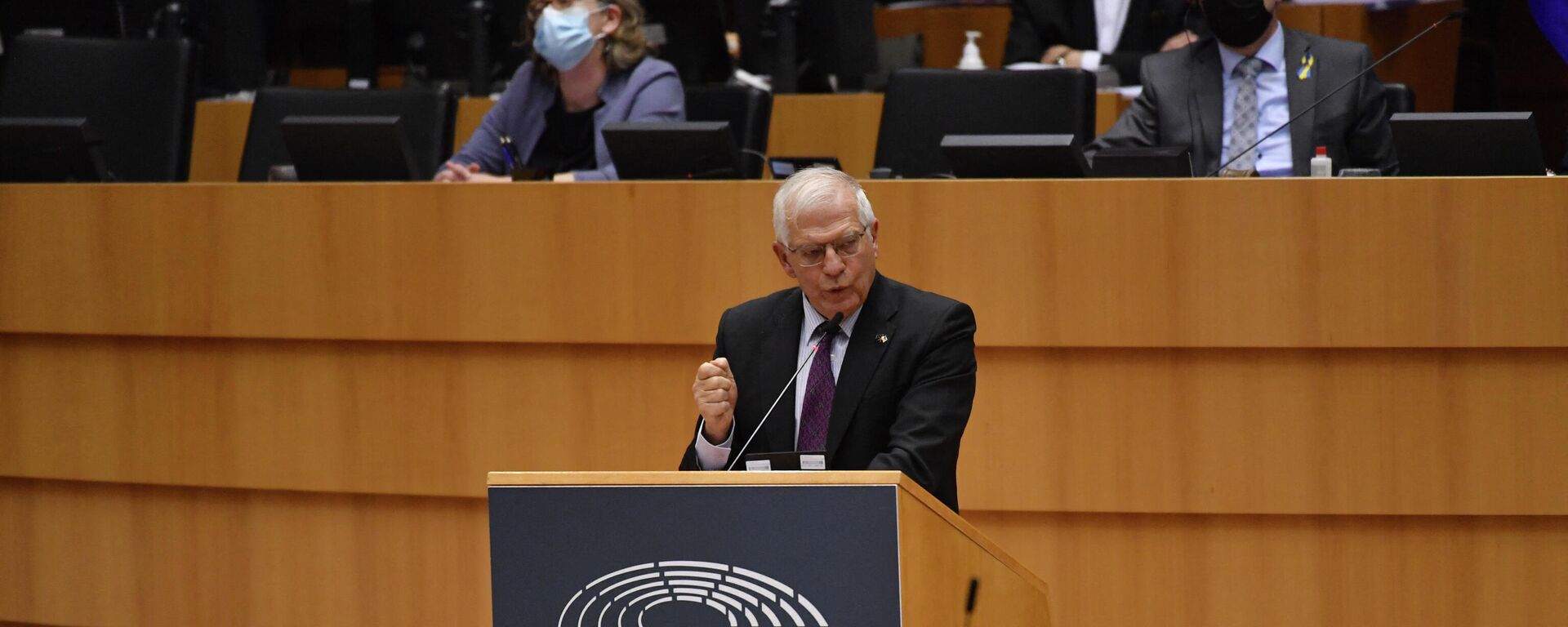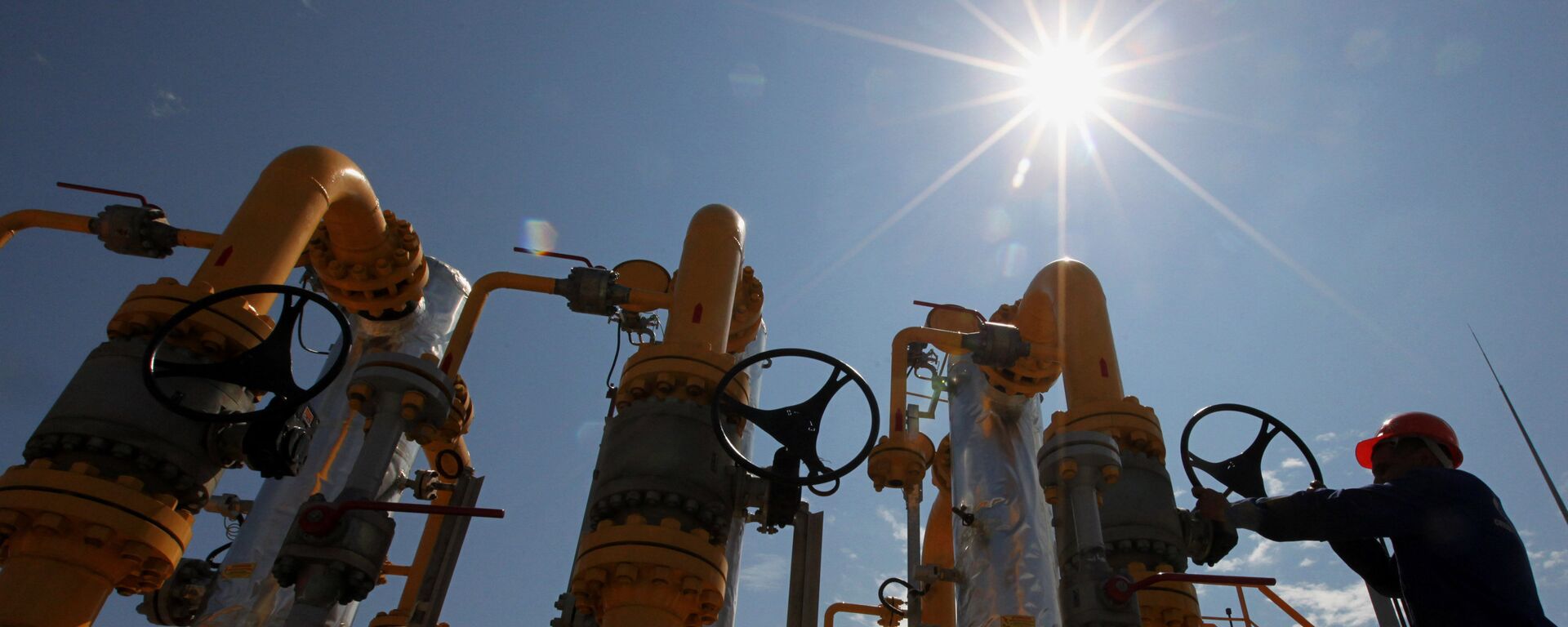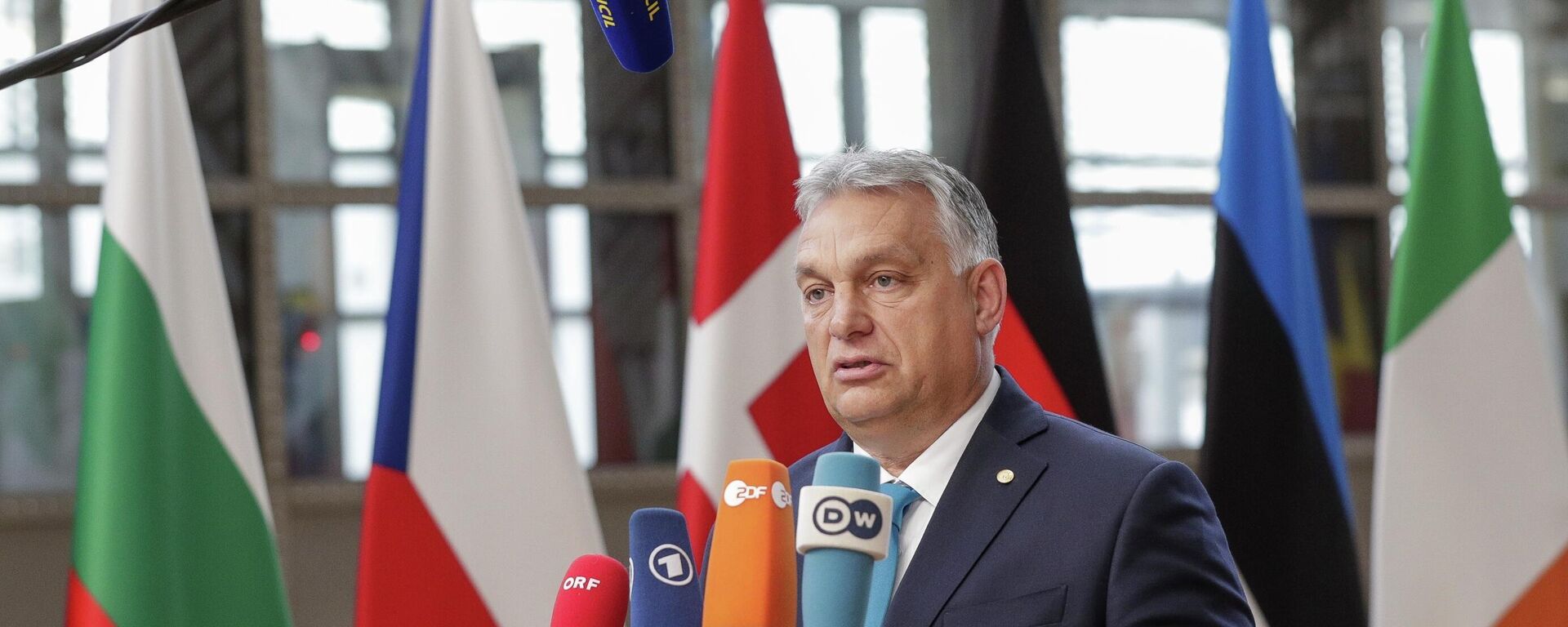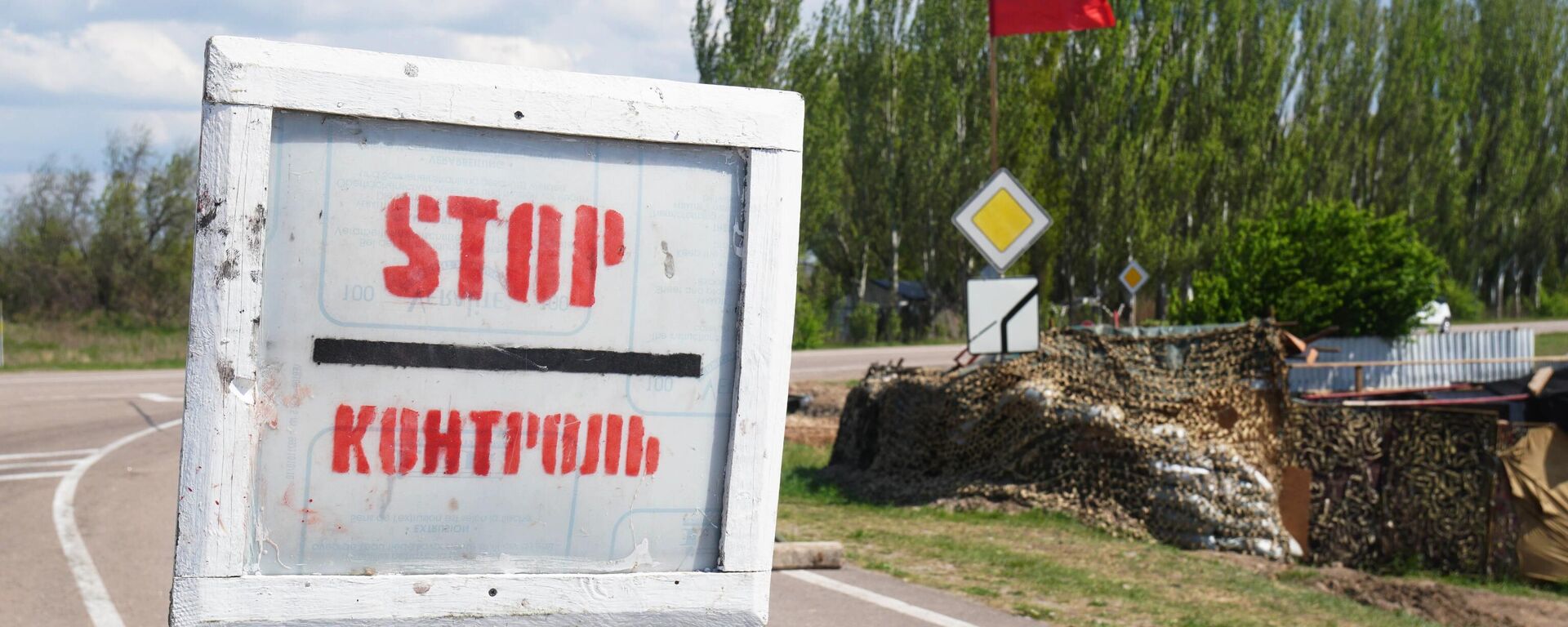https://sputnikglobe.com/20220512/eus-self-inflicted-energy-crisis-threatens-to-cut-blocs-economic-growth-in-half-report-says-1095468329.html
EU’s Self-Inflicted Energy Crisis Threatens to Cut Bloc’s Economic Growth in Half, Report Says
EU’s Self-Inflicted Energy Crisis Threatens to Cut Bloc’s Economic Growth in Half, Report Says
Sputnik International
Brussels estimates that it will have to spend nearly 200 billion euros over the next five years to wean itself off Russian energy supplies. Efforts in this... 12.05.2022, Sputnik International
2022-05-12T15:52+0000
2022-05-12T15:52+0000
2022-05-12T17:33+0000
ukraine
russia
europe
energy
https://cdn1.img.sputnikglobe.com/img/07e5/0a/0c/1089862215_0:0:3072:1728_1920x0_80_0_0_be6b98e1d36c0671e201d20068c625f1.jpg
The extension of the crisis in Ukraine and continued piling on of sanctions against Russia will mean lasting high energy prices, high inflation, rising production costs, and the lowering of consumer spending power in Western countries, the Wall Street Journal reports, citing economists and industry leaders.The growing percentage of household income that Americans and Europeans have to spend on energy has a ripple effect, with less disposable income left for other goods and services. JP Morgan assumes that the 20 percent jump in gasoline prices recently seen in the US has reduced consumer spending in other areas equivalent to $9.6 billion per month.With little oil and gas resources of its own, Europe is in an even worse off spot, experiencing a 40 percent year-on-year jump in energy costs – the largest in over 50 years, including the tumultuous 1970s with the 1973 Arab oil embargo and 1979 Iran-Iraq War price shocks. Energy costs have also risen by 54 percent in the UK, and are expected to jump 40 percent in October, with economists expecting a recession to formally kick off in the second quarter.In a speech last week, European Central Bank chief Philip Lane said Europe’s dependence on imports of energy “constitutes a major adverse terms-of-trade shock, reducing the aggregate real income of the euro area”. The ECB has calculated that in the final quarter of 2021, before the Ukraine crisis exploded into open confrontation, energy costs had cost the bloc the equivalent of 1.3 percent of its gross domestic product. Losses are feared to have accelerated since.The lower-than-expected growth expectations are especially disappointing given the low baseline measurement, as the region continues to recover from COVID and its associated lockdowns, mandates, and other restrictions. Economists also expect much of the savings cushion amassed by the population during the pandemic to be wiped out by inflation and price increases.The dual-blow nature of rising energy costs plus inflation also threatens recovery, with measures taken to cool inflation by raising interest rates expected to hit at growth.Industry leaders have warned that an abrupt and total loss of Russian energy supplies before the EU manages to find potential alternatives would even further exacerbate the crisis.On Wednesday, the Financial Times reported on draft plans from the European Commission indicating that the bloc would have to spend 195 billion euros ($203 billion) through 2027 to achieve "energy independence" from Russia. Along with increasing oil and gas supplies from other markets (which requires the construction of new LNG terminals), Brussels hopes to offset Russian energy through more solar, geothermal, wind, hydrogen, and biomethane-sourced energy.Last week, EC President Ursula von der Leyen proposed an EU-wide ban on Russian oil imports as part of a sixth package of sanctions against Moscow over its military operation in Ukraine. Some EU members expressed reticence to the idea, with Hungarian Prime Minister Viktor Orban saying the measure would be “tantamount to dropping an atomic bomb on the Hungarian economy”.Brussels also expects bloc members to cut down on imports of Russian natural gas by two thirds before the end of 2022, simultaneously demanding that they refill underground gas storage facilities as soon as possible, before the return of winter.Swiss newspaper Neue Zurcher Zeitung has warned that an embargo on Russian oil could actually end up benefiting Russia, at least over the short term, with the expected spike in prices that would follow a ban allowing Moscow to earn the same profits from less exported black gold.Earlier this week, Russian Deputy Prime Minister Alexander Novak said that Russian oil companies were already working to create new supply chains and finding additional markets in the Asia-Pacific to make up for the loss of European contracts.Separately, the Russian Central Bank has reported a current account surplus of $58.2 billion between January and March – more than two-and-a-half times that of the corresponding period of 2021.EU members that are economic beneficiaries of the Russian energy market, and those who heavily depend on Russian supplies for their oil and gas, have resisted bloc directives. On Monday, sources told the Financial Times that Malta and Greece had successfully lobbied Brussels to drop planned sanctions on European-flagged tankers carrying Russian oil. Hungary, Austria, the Czech Republic, Slovakia, and others have rejected plans to rapidly phase out Russian energy, saying they have no easily-sourced alternatives to Russian supplies.On Thursday, the US State Department expressed confidence that the EU would nevertheless move forward with plans to introduce a ban on Russian oil in the coming weeks.
https://sputnikglobe.com/20220511/eus-borrell-says-bloc-wants-to-weaken-russian-war-machine-not-fight-moscow-directly-1095441734.html
https://sputnikglobe.com/20220510/emergency-loans--rationing-germany-devising-crisis-plan-for-abrupt-end-to-russian-gas-supply-1095395315.html
https://sputnikglobe.com/20220507/like-an-atomic-bomb-dropped-on-the-hungarian-economy-eu-rewrites-proposed-russian-oil-ban--1095324854.html
https://sputnikglobe.com/20220512/live-updates-one-killed-seven-wounded-as-ukrainian-forces-shell-russias-belgorod-region-1095450148.html
ukraine
Sputnik International
feedback@sputniknews.com
+74956456601
MIA „Rosiya Segodnya“
2022
News
en_EN
Sputnik International
feedback@sputniknews.com
+74956456601
MIA „Rosiya Segodnya“
Sputnik International
feedback@sputniknews.com
+74956456601
MIA „Rosiya Segodnya“
ukraine, europe, energy
EU’s Self-Inflicted Energy Crisis Threatens to Cut Bloc’s Economic Growth in Half, Report Says
15:52 GMT 12.05.2022 (Updated: 17:33 GMT 12.05.2022) Brussels estimates that it will have to spend nearly 200 billion euros over the next five years to wean itself off Russian energy supplies. Efforts in this direction have already sparked dire warnings from the EU’s economies, with industry leaders fearing the process could spark the region’s worst economic crisis since the Second World War.
The extension of the crisis in Ukraine and continued piling on of sanctions against Russia will mean lasting high energy prices, high inflation, rising production costs, and the lowering of consumer spending power in Western countries, the Wall Street Journal
reports, citing economists and industry leaders.
The growing percentage of household income that Americans and Europeans have to spend on energy has a ripple effect, with less disposable income left for other goods and services. JP Morgan assumes that the 20 percent jump in gasoline prices recently seen in the US has reduced consumer spending in other areas equivalent to $9.6 billion per month.
With little oil and gas resources of its own, Europe is in an even worse off spot, experiencing a 40 percent year-on-year jump in energy costs – the largest in over 50 years, including the tumultuous 1970s with the 1973 Arab oil embargo and 1979 Iran-Iraq War price shocks. Energy costs have also risen by 54 percent in the UK, and are expected to jump 40 percent in October, with economists expecting a recession to formally kick off in the second quarter.
In a speech last week, European Central Bank chief Philip Lane said Europe’s dependence on imports of energy “constitutes a major adverse terms-of-trade shock, reducing the aggregate real income of the euro area”. The ECB has calculated that in the final quarter of 2021, before the Ukraine crisis exploded into open confrontation, energy costs had cost the bloc the equivalent of 1.3 percent of its gross domestic product. Losses are feared to have accelerated since.
This week, Swedish lending giant SEB cut its Eurozone growth forecast from 4 percent to 2.1 percent for 2022.
The lower-than-expected growth expectations are especially disappointing given the low baseline measurement, as the region continues to recover from COVID and its associated lockdowns, mandates, and other restrictions. Economists also expect much of the savings cushion amassed by the population during the pandemic to be wiped out by inflation and price increases.
The dual-blow nature of rising energy costs plus inflation also threatens recovery, with measures taken to cool inflation by raising interest rates expected to hit at growth.
Industry leaders have warned that an abrupt and total loss of Russian energy supplies before the EU manages to find potential alternatives would even further exacerbate the crisis.
“We cannot really fully judge what’s going to happen if there would be really a cutoff of gas”, Volkswagen AG CEO Herbert Diess said this week. “We’re trying to be as resilient as possible”.
On Wednesday, the Financial Times
reported on draft plans from the European Commission indicating that the bloc would have to spend 195 billion euros ($203 billion) through 2027 to achieve "energy independence" from Russia. Along with increasing oil and gas supplies from other markets (which requires the construction of new LNG terminals), Brussels hopes to offset Russian energy through more solar, geothermal, wind, hydrogen, and biomethane-sourced energy.
Last week, EC President Ursula von der Leyen proposed an EU-wide ban on Russian oil imports as part of a sixth package of sanctions against Moscow over its military operation in Ukraine. Some EU members expressed reticence to the idea, with Hungarian Prime Minister Viktor Orban saying the measure would be “tantamount to dropping an atomic bomb on the Hungarian economy”.
Brussels also expects bloc members to cut down on imports of Russian natural gas by two thirds before the end of 2022, simultaneously demanding that they refill underground gas storage facilities as soon as possible, before the return of winter.
Swiss newspaper Neue Zurcher Zeitung has
warned that an embargo on Russian oil could actually end up benefiting Russia, at least over the short term, with the expected spike in prices that would follow a ban allowing Moscow to earn the same profits from less exported black gold.
Earlier this week, Russian Deputy Prime Minister Alexander Novak
said that Russian oil companies were already working to create new supply chains and finding additional markets in the Asia-Pacific to make up for the loss of European contracts.
Separately, the Russian Central Bank has
reported a current account surplus of $58.2 billion between January and March – more than two-and-a-half times that of the corresponding period of 2021.
EU members that are economic beneficiaries of the Russian energy market, and those who heavily depend on Russian supplies for their oil and gas, have resisted bloc directives. On Monday, sources
told the Financial Times that Malta and Greece had successfully lobbied Brussels to drop planned sanctions on European-flagged tankers carrying Russian oil. Hungary, Austria, the Czech Republic, Slovakia,
and others have rejected plans to rapidly phase out Russian energy, saying they have no easily-sourced alternatives to Russian supplies.
On Thursday, the US State Department expressed confidence that the EU would nevertheless move forward with plans to introduce a ban on Russian oil in the coming weeks.
